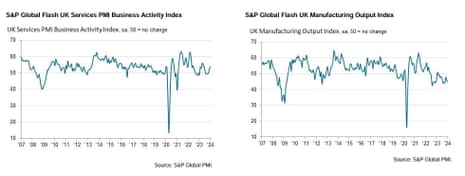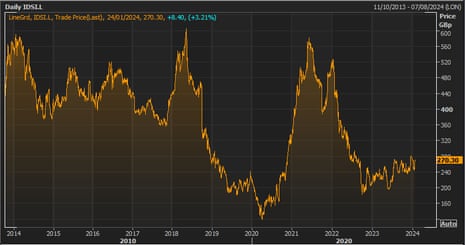
Full story: Royal Mail could save £650m by switching to three-day-a week service, says Ofcom
Alex Lawson
Royal Mail could save up to £650m if it delivered letters just three days a week and £200m by stopping Saturday deliveries, the communications regulator has said (see 6.52am).
The watchdog said a reduction from six to five days a week would save £100m to £200m, and going down to three days £400m to £650m, my colleague Alex Lawson reports.
In a much-anticipated review, Ofcom laid out a series of options for the future of the universal service obligation (USO), which requires Royal Mail to deliver nationwide, six days a week, for a fixed price.
The regulator began gathering evidence to show how the future of the service may be reformed to better suit consumers’ needs, amid a long-term decline in letter volumes and a surge in the number of parcels sent as online shopping has grown.
It has conducted consumer research and modelled Royal Mail’s finances in the review, and will seek views with a further update planned later this year.
More here:
Key events
Metro Bank’s white knight moves onto the board

Kalyeena Makortoff
Metro Bank’s white knight investor – the Columbian billionaire who helped rescue the bank in early October – has clinched a seat on the lender’s board.
Metro confirmed that the 65-year-old banking tycoon Jaime Gilinski Bacal would become a non-executive director, months after ploughing £100m of emergency funds into the lender in exchange a 53% stake.
Metro Bank’s chair, Robert Sharpe, said:
“Jaime’s appointment underscores the commitment he has long shown to the bank as a supportive, long-term shareholder. He brings decades of banking expertise and experience which will prove invaluable on the next stage of the bank’s journey.”
As part of his rescue agreement, Bacal has been given the green light to appoint up to three directors in total to the board.
However, he already leveraged his position into a boardroom seat for his daughter Dorita Gilinski in autumn 2022.
Bacal said in a statement:
“There are many opportunities for Metro Bank to grow and I am looking forward to playing a part in the evolution of the bank as we build on the solid foundational work undertaken to date.”
Economic storm clouds are also gathering over Germany.
This morning, Germany’s Ifo institute downgraded its 2024 economic growth forecast to 0.7%, down from 0.9%. Ifo cited uncertainty caused bya constitutional court ruling that has left the government scrambling to revamp this year’s budget.
And there could be worse ahead, if geopolitical tensions worsen.
The Bundesbank has estimated today that an economic crisis in China would knock some 1.5% off German economic growth.
According to its simulations, real German GDP would be 0.7% lower in the first year of the crisis and just under 1% in the second year.
Germany’s close trade relations with China could wreak havoc on the financial system of Europe’s largest economy if they were to deteriorate, the Bundesbank warns https://t.co/ejBzil80EF
— Bloomberg Economics (@economics) January 24, 2024
UK factories aren’t the only parts of the economy finding January tough.
Revolution Bars slashed its outlook for the year, telling shareholders that “January trade has started softly as guests recover from the expense of Christmas.”
Revolution is also facing higher wage bills, with the minimum wage set to rise by almost 10% in April, while customer numbers have been hit by Aslef train strikes.
Rob Pitcher, CEO of Revolution Bars Group, says last Christmas was the best in four years, adding,
It was pleasing to see our Revolution guests experience their first uninterrupted Christmas since 2019, driving growth for the brand.
Revolution’s younger guests are however still feeling the disproportionate effect of the cost-of-living crisis. Looking forward, both business rates and national living wage will increase materially in April 2024 and therefore we have had to take the view that, with inflation remaining high, the recovery for the Revolution business, our largest brand, will take longer than we had previously forecast.
UK factories suffer new hit to orders, cut investment plans
Newsflash: British manufacturers have been hit with a fresh drop in orders and have scaled back their investment plans, new data from the CBI shows.
The CBI’s industrial trends survey shows a contration in orders – its quarterly order book balance dropped to -13 in the three months to January, its lowest since July 2020.
The survey also shows firms expect to cut back on investment in tangible assets such as buildings, machinery and equipment.
Investment intentions for the year ahead were mixed. Manufacturers expect to raise spending on training & retraining. But investment in product & process innovation, buildings and plant & machinery is expected to fall. #ITS pic.twitter.com/KkoM17eVBd
— CBI Economics (@CBI_Economics) January 24, 2024
It also shows a rise in costs – which may be due to the Red Sea crisis disrupting supply chains, as this morning’s PMI report showed.
Growth in average costs rose rapidly in the quarter to January, accelerating for the first time since April 2022. Manufacturers expect costs to remain elevated in the quarter to April. Domestic price inflation was broadly stable, but export price inflation accelerated. #ITS pic.twitter.com/fntfPL5cU4
— CBI Economics (@CBI_Economics) January 24, 2024
CBI Deputy Chief Economist Anna Leach says:
“Conditions in the manufacturing sector deteriorated unexpectedly at the start of the year, with output falling and order books at their weakest since the depths of the COVID-19 pandemic,”
The latest CBI Industrial Trends Survey found that output volumes fell in the quarter to January, after being unchanged in the three months to December. Firms expect volumes to return to growth in the next three months. #ITS pic.twitter.com/xEW2LIzKza
— CBI Economics (@CBI_Economics) January 24, 2024
Worryingly, the report also shows manufacturers are cutting back on their headcounts:
The pound has strengthened against the US dollar, after this morning’s PMI report showed supply chain disruption was pushing up costs.
Sterling has hit $1.277, the highest in over a week, suggesting a dialling-back of interest rate cut expectations….
7-month high in UK composite PMI for January (52.5; 52.1 prev.) & keeps UK at the top of this league table at start of 2024. The spread between weak manufacturing (44.8) & strong services activity (53.8) is something of a chasm (but also a global trend). pic.twitter.com/Ro066qdk8k
— Simon French (@shjfrench) January 24, 2024
The UK PMIs point to brighter growth outlook but stubborn inflation, says ING developed markets economist James Smith.
“The UK service sector, which accounts for the lion’s share of economic output, edged further into growth in January, according to the latest purchasing manager’s index.
What’s particularly interesting is that this extends a recent trend whereby UK service sector growth is apparently accelerating at a time when the equivalent eurozone index is edging further into contraction (though Europe’s manufacturing sector appears to be bottoming out). Before last autumn, the UK’s services PMI had largely tracked what was happening in its closest neighbours.
This is another signal that the consensus among economists going into this year, which suggests the UK will underperform most major European economies in 2024, looks a bit too gloomy.
While the recent sharp fall in market rates is good news for all economies, in the UK it makes a particular difference to the mortgage squeeze given the relatively high share of households due to refinance this year (around a fifth).
Eurozone private sector still shrinking
Over in the eurozone, business activity in the euro area fell at the slowest rate for six months in January.
The eurozone Composite PMI Output Index has risen to 47.9, showing the smallest monthly contraction in six months (but below the UK’s 52.5, which showed growth).
And although disruptions to shipping in the Red Sea caused eurozone supply chains to lengthen for the first time in a year, manufacturing input costs continued to fall on average, S&P Global reports.
Today’s Flash PMI report on the UK economy (see 9.44am) shows that price pressures remain high, points out Ashley Webb, UK economist at Capital Economics.
And that may worry the Bank of England, and make policymakers less keen to consider cutting interest rates.
Webb explains:
The services output prices balance nudged down from 58.6 to 57.3. But that remains consistent with services CPI inflation easing only gradually from 6.4% in December to around 5.0% in about six months’ time. What’s more, the shipping disruptions in the Red Sea led to the steepest lengthening in suppliers’ delivery times since September 2022 and caused the input prices balance of the manufacturing PMI to rise from 47.5 to 53.5, to its highest level since March 2023.
The further small rise in the composite activity PMI, from 52.1 in December to 52.5 in January, suggests that “the economy has improved”, Webb adds.
UK factories hit by Red Sea crisis, but recession could be avoided
Newsflash: the Red Sea crisis is hitting UK manufacturing supply chains and pushing up input costs.
Data firm S&P Global reports that its flash UK Manufacturing Output Index, which tracks factory production, has fallen to a three-month low of 44.9. Any reading below 50 shows a contraction.
S&P Global’s survey of UK purchasing managers has found that manufacturing supply chains suffered from longer wait times for container freight during January in the wake of the Red Sea crisis.
With supplies taking longer to arrive, firms have been running down their inventories.
S&P Global explains:
Supplier delays were overwhelmingly linked to longer international shipping times as vessels rerouted away from the Suez Canal. At the same time, preproduction inventories fell to the greatest extent since last August as safety stocks were depleted.
These longer delivery times are adding to costs, with S&P Global predicting UK inflation will remain “stubbornly higher” in the 3-4% range in the near future (it rose to 4% in December).

The better news is that services companies are growing at the fastest rate in eight months, with the UK Services PMI rising to 53.8.
That helped the wider recovery in private sector output gains momentum in January, lifting the overall UK PMI Composite to a seven-month high of 52.5.
That should help the economy avoid recession, they say.
💥 flash UK #PMI composite output index (manufacturing and services) rose again in January to 52.5 (December 52.1), a 7-month high… 👍
Touch and go whether the UK avoided a technical ‘#recession‘ in the second half of last year, but 2024 already looking a lot brighter 🤓 pic.twitter.com/EnvRB4oDHK
— Julian Jessop (@julianHjessop) January 24, 2024
Chris Williamson, Chief Business Economist at S&P Global Market Intelligence said:
“UK business activity growth accelerated for a third straight month in January, according to early PMI survey data, marking a promising start to the year. The survey data point to the economy growing at a quarterly rate of 0.2% after a flat fourth quarter, therefore skirting recession and showing signs of renewed momentum.
Businesses have also become more optimistic about the year ahead, with confidence rebounding to its highest since last May. Business activity and confidence are being in part driven by hopes of faster economic growth in 2024, in turn linked to the prospect of falling inflation and commensurately lower interest rates.
Shares in IDS keep rising
Shares in Royal Mail’s parent company, International Distributions Services, have now jumped 3.4% in London, as traders ponder the savings it could make from fewer deliveries.
That’re up 9p at 270p, adding to their earlier gains.
Royal Mail shares floated at 330p in 2013, and swiftly surged over 500p.
But they’ve had a choppy ride since, hitting record lows below 120p early in the pandemic before receiving a boost from parcel demand.

Victoria Scholar, head of investment at interactive investor, points out that there is opposition to Ofcom’s suggested improvements to the Royal Mail universal service obligation:
Royal Mail has long had its calls to scrap the government’s USO rejected. Now it looks like the tide could potentially be turning. Although there is still considerable opposition including from the Communication Workers Union (CWU) which argues a three day service would ‘destroy’ the company, as well as the Postal Affairs Minister Kevin Hollinrake who said the government is committed to a six-day service.
The company owned by International Distribution Services, has been facing a series of painful setbacks like the postal strikes, a fine from Ofcom for missing delivery targets and a cyber security incident. It has also been struggling with heavy operating losses on the back of a long-term structural decline in letter demand and the loss of its 360-year-old monopoly on delivery parcels from Post Office branches. Ofcom said letter volumes have halved since 2011, raising existential concerns about the future of Royal Mail and prompting calls for a drastic overhaul of the business to revitalise its finances and operations to ensure it doesn’t become ‘unsustainable.’
Shares in IDS are trading higher today reflecting optimism towards the regulator’s openness towards change at the embattled postal business. But shares are still sharply lower than the recent highs seen in 2021 during covid.”
Shares in easyJet have jumped 5%, despite the budget airline taking a £40m hit from the conflict in the Middle East.
EasyJet reported that there was a temporary slowdown in flight bookings for the wider industry after the 7 October attacks, as well as an ongoing pause on flights to Israel and Jordan.
But, it says, demand and bookings have recovered strongly from late November.
This allowed it to narrow its pre-tax loss in the last quarter, to £126m, from £133m in October-December 2022.
Over in China, policymakers are cutting the amount of cash that banks must hold in their reserves, to stimulate the economy.
The People’s Bank of China (PBOC) has announce it will cut the reserve requirement ratio (RRR) for all banks by 50 basis points (bps) from 5 February.
This is the first RRR cut this year, and should free up 1 trillion yuan (£110bn) to support lending.
China’s stock markets rose today, with the CSI 300 index up 1.4%. Mining stocks are rallying in London too.
Minister: Fujitsu should pay hundreds of millions of pounds compensation over UK Post Office scandal
Kevin Hollinrake, the minister for postal services, believes Japanese IT firm Fujitsu should pay “hundreds of millions of pounds” in compensation for its role in the Post Office scandal.
Speaking to the Today programme, Hollinrake said:
This will cost the taxpayer a billion pounds, maybe more than that.
He added that Fujitsu, which supplied the flawed Horizon software, should pay “a significant proportion” of that bill.
Last week, Fujitsu Europe’s boss admitted the firm has a “moral obligation” to contribute to compensation for sub-postmasters who were wrongly prosecuted due to Horizon reporting that money was missing from their branches.
The inquiry into Horizon also heard last week that some Horizone bugs were known about as early as 1999, but this information was kept from the courts.
Hollinrake says what has happened is “absolutely disgraceful” and a “horrendous scandal”, in terms of both its scale and depth, and the impact on people’s lives.
